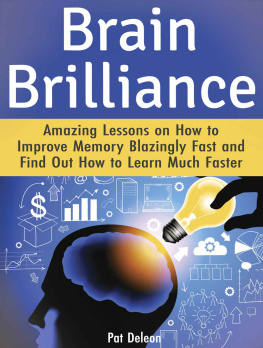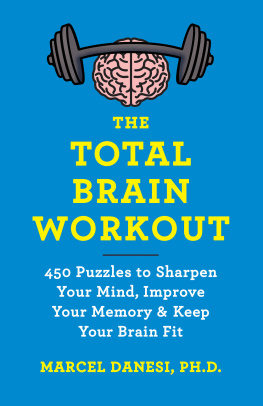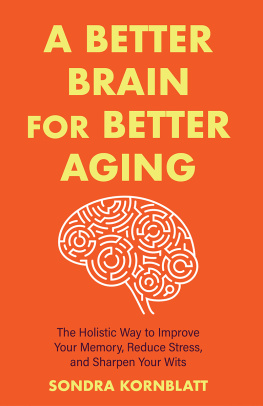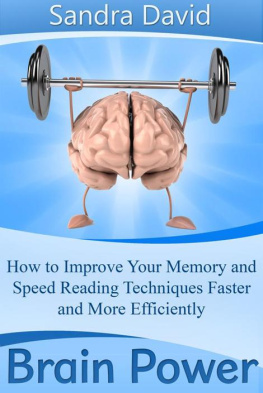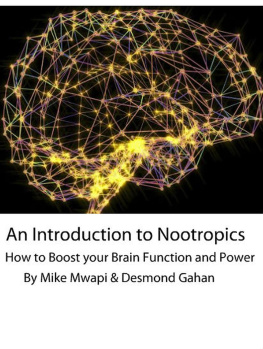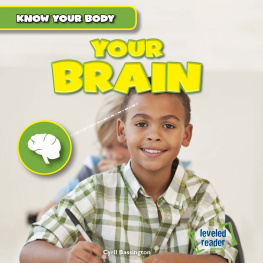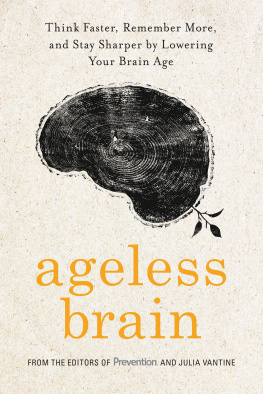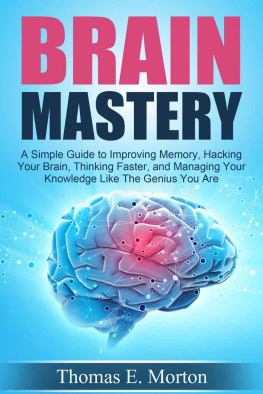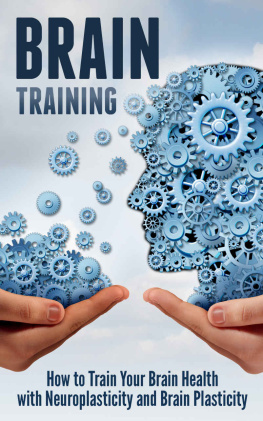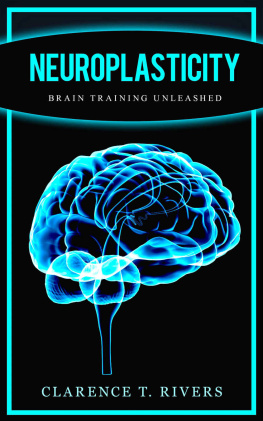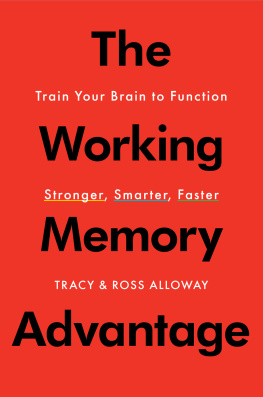Brain Brilliance
Amazing Lessons on How to Improve Memory Blazingly Fast and Find Out How to Learn Much Faster
Table of Contents
Copyright Notice
Copyright 2015 by Pat Deleon- All rights reserved.
This document is geared towards providing exact and reliable information in regards to the topic and issue covered. The publication is sold with the idea that the publisher is not required to render accounting, officially permitted, or otherwise, qualified services. If advice is necessary, legal or professional, a practiced individual in the profession should be ordered.
- From a Declaration of Principles which was accepted and approved equally by a Committee of the American Bar Association and a Committee of Publishers and Associations.
In no way is it legal to reproduce, duplicate, or transmit any part of this document in either electronic means or in printed format. Recording of this publication is strictly prohibited and any storage of this document is not allowed unless with written permission from the publisher. All rights reserved.
The information provided herein is stated to be truthful and consistent, in that any liability, in terms of inattention or otherwise, by any usage or abuse of any policies, processes, or directions contained within is the solitary and utter responsibility of the recipient reader. Under no circumstances will any legal responsibility or blame be held against the publisher for any reparation, damages, or monetary loss due to the information herein, either directly or indirectly.
Respective authors own all copyrights not held by the publisher.
The information herein is offered for informational purposes solely, and is universal as so. The presentation of the information is without contract or any type of guarantee assurance.
The trademarks that are used are without any consent, and the publication of the trademark is without permission or backing by the trademark owner. All trademarks and brands within this book are for clarifying purposes only and are the owned by the owners themselves, not affiliated with this document.
Disclaimer
While all attempts have been made to verify the information provided in this book, the author does not assume any responsibility for errors, omissions, or contrary interpretations of the subject matter contained within. The information provided in this book is for educational and entertainment purposes only. The reader is responsible for his or her own actions and the author does not accept any responsibilities for any liabilities or damages, real or perceived, resulting from the use of this information.
Introduction
Since very ancient times, people have pondered the mysterious workings of the brain. Even as far back as the fourth century B.C. some unknown Sumerian writer is known to have commented on the unusual effects of the poppy plant on the mind. There is even some archaeological evidence of a primitive form of brain surgery in prehistoric times. (We can only speculate on the reason for this.)
As the mission to understand the workings of the human brain have progressed through time, our understanding of it seemed to get more and more obscure. Questions arose: how do we learn? How can we improve our ability to learn? How can we make our brain function at top level?
Even when the subject is narrowed to focus on the memory, scientists, poets, and everyday thinkers are still mystified. Jane Austen commented on the subject of memory in her novel Mansfield Park when she wrote something along the lines of how memory is probably our most wonderful faculty, but at the same time its the most incomprehensible and unpredictable.
How many of us walk into a room and forget why were there? Or we cant for the life of us remember where we put our keys? Or maybe we ran into someone whose face we remembered well, but we just couldnt think of their name? Sometimes we might worry that were completely losing our memory, but doctors will tell us that lapses such as these are completely normal.
On the other hand, if we deliberately try to un-remember something such as a broken romance or a traumatic experience, we find that our memory continues to bedevil us with flashes of what we are trying to forget.
Yes, memory is fickle and often unpredictable. But it is only a part of the functioning of our brain. While we may never completely understand the complicated workings of our brain, science has discovered things we can do to maximize brain function, to improve memory, and to learn faster and more efficiently.
BONUS: Your FREE Gift

Thank you for purchasing my book: " Brain Brilliance ". I want to show you my appreciation by offering an exclusive eBook 10 Secrets That Will Help You Improve Your Photographic Memory for FREE.
Simply Click the Button Below

OR Go to This Page
http://successmasterycamp.com/free/
Chapter 1 The Inner Workings of Your Brilliant Brain
Neurons
Your brain function depends on the health of the trillions of nerve cells in your brain known as neurons. These cells essentially provide the hard-wiring in your brain, and their job is to ensure proper functioning of all the bodys systems through receiving electrical and chemical signals from other cell groups in the body and passing the information through the appropriate networks through neurotransmitters.
Neurons work collaboratively as a collective to process information. They can die off, but they can also be regenerated. When something goes wrong with the brain, chances are that the problem started with neurons or their support system. Aging can produce degeneration of neurons; in fact, if youre not creating neurons every day, youre losing them.
Other factors that affect the health of your brain cells include diseases such as Parkinsons disease, Alzheimers disease, and Huntingtons disease. Head and spinal cord injuries can also cause permanent brain damage.
As if those factors werent enough, your behavior and lifestyle also have an effect on the wellness of your brain. Malnutrition, nutritional deficiencies, lack of sufficient exercise, and stress take a significant toll on memory and cognitive function. And, of course, unhealthy habits such as alcohol and drug abuse have been shown to significantly impair brain performance.
Bad News, Good News
By the time you reach your 75 th birthday you will probably have lost about 10% of your neurons. If you have engaged in any of the behaviors mentioned above, the percentage can be even higher. Without some kind of intervention, you can experience cognitive decline, where your brain power begins to fail by degrees. You will find it becomes increasingly difficult to learn and process information, and your memory will let you down repeatedly.
But cognitive problems are not just limited to the elderly. The saying Use it or lose it! applies to the brain at any age. If you dont continue to challenge and stimulate your brain, youll find that your cognitive functioning will deteriorate pretty rapidly. And if youre not taking care of your general health, your brain will suffer with the rest of your body.
The good news is that there are things that everyone can do to not only prevent loss of neurons and their supporting cells, but also to actually promote neuron regeneration and improve the overall functioning of your brain.
Chapter 2 Brilliant Nutrition Means a Brilliant Brain

